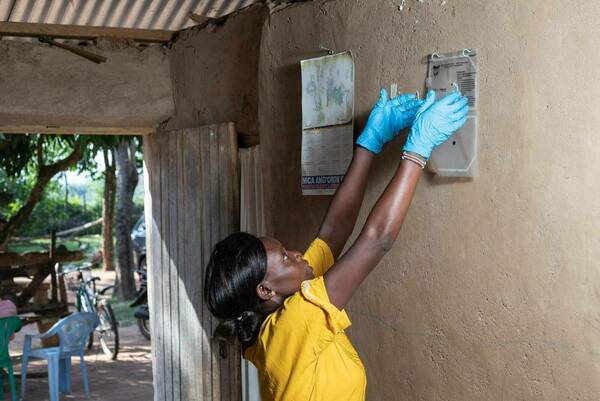Alumnus Khan Shairani named US Department of State Critical Language Scholar
University of Notre Dame alumnus Khan Shairani, who received his doctorate in peace studies and history from the Kroc Institute for International Peace Studies in May, has been selected for the U.S. Department of State’s Critical Language Scholarship Program.
Shairani, who is interested in the intersection between religion and peace, completed his dissertation examining the intellectual legacy of two 18th-century Islamic scholars from the Mughal and Ottoman empires who transformed the epistemologies of classical Islamic thought in response to internal and colonial challenges. In particular, he explored how Muslims could navigate tumultuous times by reengaging and reviving their tradition.
His other research interests include colonialism and post-colonialism, Islamic theosophy and representations of Muslims in film.
Shairani received his undergraduate degree in Arabic and Chinese from Williams College and his master’s degree in Islamic studies from Harvard Divinity School. While at Notre Dame, he was a translator and instructor for the Madrasa Discourses program. He also founded the Graduate School club Film Lovers of International Cinema, which introduces intersectional and diverse cinema to students.
Shairani’s research has been supported by the Benjamin A. Gilman International Scholarship as well as Notre Dame’s Nanovic Institute for European Studies, Liu Institute for Asia and Asian Studies and Kroc Institute for International Peace Studies. He has also received the Qasid Annual Scholarship for the study of Quranic Arabic in Jordan.
As a Critical Language Scholar, he is currently studying Persian.
“The Critical Language Scholarship for Persian will help me advance my skill set and Indo-Persian texts, an important source for historical information on the Indian subcontinent,” Shairani said. “This will be essential for engaging critical sources for understanding and producing scholarship on the early modern period in South Asia.”
The Critical Language Scholarship Program is an intensive overseas language and cultural immersion program for American students enrolled at U.S. colleges and universities. Students spend eight to 10 weeks abroad studying one of 13 critical languages. The program includes intensive language instruction and structured cultural enrichment experiences designed to promote rapid language gains.
This year’s cohort of approximately 500 scholars was selected from a pool of more than 5,000 applicants. Recipients come from all 50 U.S. states, as well as the District of Columbia and Puerto Rico, and include students from more than 200 institutions of higher education, including public and private universities, community colleges, liberal arts colleges, military academies and minority-serving institutions.
“We congratulate Dr. Shairani on receiving this prestigious award that will expand his already impressive linguistic skills and disciplinary expertise,” said Michael Skalski, associate program director for the Graduate School’s Office of Grants and Fellowships. “The Critical Language Scholarship Program, like other similar fellowships, helps our researchers not only to develop their professional skills, but also to become the sought-after experts in regional languages and cultures. Combined with the training Notre Dame offers, our alumni are well equipped to become a force for global good.”
For more on this and other scholarship opportunities, visit cuse.nd.edu (undergraduate students) or graduateschool.nd.edu/graduate-training/research-communication/the-office-of-grants-and-fellowships/ (graduate students).
Originally published by at news.nd.edu on July 30, 2024.
Latest Research
- NSF Cyber SMART’s fall meeting shapes fifth year of project, legacy and future plans, and adds new memberThe U.S. National Science Foundation (NSF) Cyber SMART center gathered for its fall meeting on the University of Notre Dame campus this September. The meeting served as a checkpoint with progress reports and new projects from research leads and students…
- Slavic and Eurasian studies professor wins Humboldt fellowship to research how Russia’s religious past shapes its presentWhen Russia invaded Ukraine on Feb. 24, 2022, Sean Griffin realized his second book needed a new title. Griffin, an associate professor in the University of Notre Dame’s Department of…
- Notre Dame’s R.I.S.E. AI Conference builds interdisciplinary collaboration to inform human-centered artificial intelligenceAs artificial intelligence (AI) transforms nearly every sector of society — from healthcare and education to governance and global development — a critical question emerges: How can we conscientiously design and deploy these powerful technologies to positively impact society? This…
- University of Notre Dame joins the Global Coalition of Ukrainian StudiesThe University of Notre Dame has joined the Global Coalition of Ukrainian Studies after signing a Memorandum of Cooperation (MOC), formalized on September 24, 2025, at the Ukrainian Institute of America in New York City. Notre Dame joined four other American…
- The University of Notre Dame’s Mendoza College of Business and Industry Labs team up to inspire national security manufacturing competitiveness in the regionThe South Bend - Elkhart Region is full of manufacturing companies that are poised to grow, and Executive Master of Business Administration (EMBA) and Master of Business Administration (MBA) students at the University of Notre Dame are finding innovative ways to contribute to that growth. Earlier…
- Notre Dame research informs WHO conditional recommendation for spatial repellents in malaria vector controlThe World Health Organization (WHO) recently announced a “conditional recommendation” for spatial emanators, also known as “spatial repellents,” in the fight against malaria. This key determination was informed by spatial repellent studies that included the Advancing Evidence for the Global Implementation of Spatial Repellents (AEGIS) Project in Kenya, led by the University of Notre Dame and funded by Unitaid. The findings from this particular study were recently published in The Lancet.













